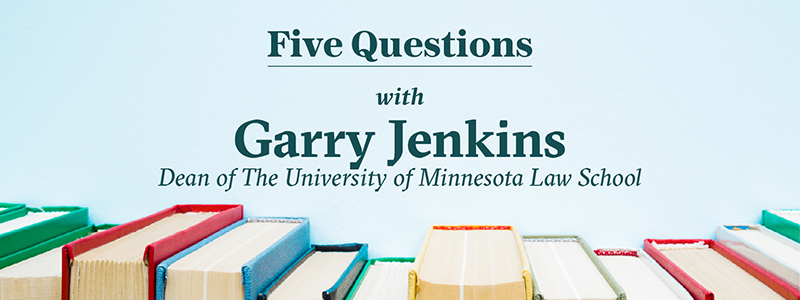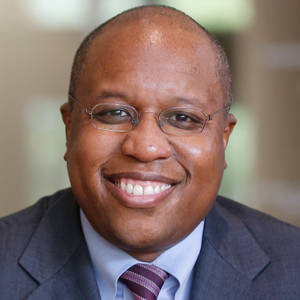
University of Minnesota Law School Dean Garry W. Jenkins answers five questions about the future of the bar exam, wellbeing, changes over the last two years, student activism in response to world events, and how the bar association can help law students.
Two years into COVID, what’s surprised you the most during this time at the University of Minnesota Law School?
First, I continue to find it enormously helpful to be a part of a great comprehensive institution like the University of Minnesota during the pandemic. The expertise found at the University and President Gabel’s focus on evidence-based decision-making and collaboration really allowed us to make good decisions during this time.
institution like the University of Minnesota during the pandemic. The expertise found at the University and President Gabel’s focus on evidence-based decision-making and collaboration really allowed us to make good decisions during this time.
Additionally, our Minnesota Law community’s response to the pandemic has been terrific. When I talk to admitted and prospective students, I’ve long emphasized our close and collegial community here at Minnesota Law. In fact, it’s one of the things that drew me to the Law School in 2016. While the past few years have been challenging for many in the Law School’s community, I have been truly humbled by the compassion our students, staff, and faculty have shown each other during this time. From students advocating for the needs of their classmates, to faculty and staff showing up for each other during difficult times, I am so proud of how much everyone has tried their very best to care for each other with compassion and grace—despite the relentless nature of the pandemic and the struggles to deliver an outstanding educational experience during this time.
As we enter this new stage of the pandemic, I am excited to see how we build on what we’ve learned and built together.
With much discussion focused on the future of the bar exam, what are your feelings about possible changes or a new approach to admitting attorneys to practice?
The short answer is that I’m extraordinarily excited about the future of the exam! I’ve been involved a bit with NCBE’s NextGen bar exam effort, and my fellow law deans and I look forward to continuing to provide more feedback and input. The current direction of the reform project seems to be on reducing the number of subjects covered, developing new types of questions that integrate the testing of knowledge and skills, and measuring foundational practice skills (e.g., legal research, client counseling, negotiation and dispute resolution, and client relationships).
At Minnesota Law, with our mission of education, outreach, and service, we have long emphasized both doctrine and skills in our legal education program. From our nationally-ranked clinical law program to our robust experiential learning offerings, all of which complement our curriculum, I know that our students are—and will continue to be— well prepared for possible changes in bar licensure.
It’s not an exaggeration to call this change a once-in-a-lifetime opportunity for our profession. So, we must get it right.
The role of attorneys, the justice system, community engagement, and advocacy, have been in the news a lot this year with a number of high-profile cases here in cities. What have discussions been like with students around these events?
Our students absolutely see this important work as both urgent and long-term. From our prospective students to our engaged 3Ls and alumni, our law student community is motivated to make an impact and make a difference in their communities and in our profession. As we all know, there’s no shortage of challenges locally, nationally, and globally, and law students are certainly harnessing their power to lead and advocate for change. Student discussions around these events reveal a combination of frustration and disappointment along with optimism and curiosity.
As dean of Minnesota Law, I am focused on preparing our students to serve as lawyer-leaders and on ensuring that they develop the skills to achieve the good they want to see in the world. Through educational programming, pro bono activities, and community partnerships, our Minnesota Law students and student organizations have a long legacy of responding directly to many crises and events. I hope students have been motivated and inspired by that tradition of engagement and difference-making.
With a renewed focus on wellbeing in the legal profession, how have you taken care of yourself during this time?
I am heartened to see so much momentum around wellness and wellbeing for law students and lawyers. We’ve certainly come a long way since my days in law school and as a new lawyer, and it’s very encouraging to see so much support for wellness and open discussion, both during law school and in the legal profession.
I believe that wellness and wellbeing are a bit like studying in law school—you have to find out what works for you and stick with it. For me, the basics work really well: exercise, sleep, and mindfulness. While it’s been really hard to make time for all three during the last few years, I try to do as much as I can. Tennis continues to be a lifesaver each week!
How can the bar associations support this rising generation of lawyers?
First, asking this question is a great place to start. We all know that students and new lawyers have a strong commitment to continuing to improve diversity, equity, and inclusion in the legal profession. Second, we also know that now more than ever, our students want to connect with each other, support vulnerable communities, and advocate for change in the profession. Bar associations need to continue to listen, remain open to change, and respond to the needs and interests of our newest lawyers. There are great opportunities now to work with new lawyers to leverage their many strengths and improve the profession for everyone.